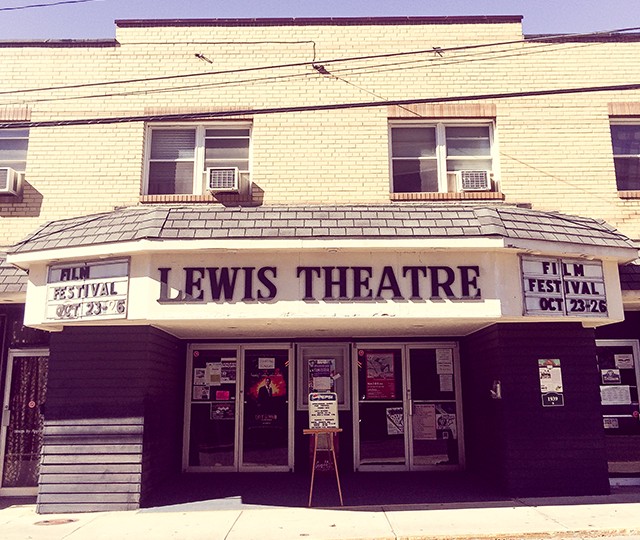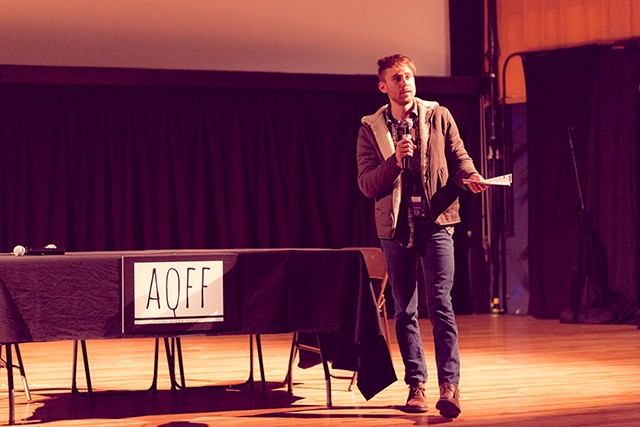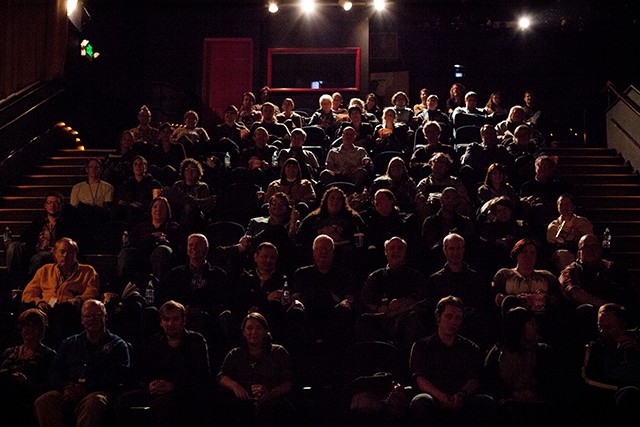Looking Back At The Screen: The First Annual Appalachian Queer Film Festival
by Erica Lies

The way the Appalachian region sits in the popular imagination, it’s the last place anyone would expect to find a film festival celebrating queer identity. But in the same month that West Virginia — -the only entirely Appalachian state — -legalized same-sex marriage, it also welcomed the first annual Appalachian Queer Film Festival, boasting a diverse lineup of features and documentaries. It included mainstream films like Skeleton Twins, starring Kristen Wiig and Bill Hader and To Be Takei, the Sundance documentary about actor George Takei. The festival featured lesser-known films such as Kumu Hina, a documentary about a transgender woman who teaches and preserves Hawai’i’s indigenous culture, and Goodbye Gauley Mountain, a protest against the ravaging practice of mountain top removal by filmmaker Beth Stephens and performance artist Annie Sprinkle.
I spoke with festival founders Tim Ward and Jon Matthews on the eve of their opening night. Over the telephone, we talked about growing up queer in Appalachia, bringing independent film to West Virginia, and showcasing the contemporary Mountain State.
Tell me where the idea for AQFF came from. What made you want to create it?
Tim Ward: I grew up in Huntington, WV, and went to a Conservative Christian school that was not tolerant about sexuality. I was aware there was something different about me, and I was aware that that something was considered unacceptable.
After I came out and accepted my own sexual identity in college, I wanted to experience a queer community that wasn’t available in Huntington. I had to drive to Columbus or Lexington or Cincinnati or Pittsburgh (which are all pretty far away) to see LGBTQ films and to see myself as a gay man reflected on screen — which I needed because it was important to shaping my identity.
So I came up with the idea for the film festival. I initially had it three years ago and approached someone that was involved with the WV International Film Festival about coming on board. And this person said, “I think it’s a really cool idea. I just don’t think it can gain much traction.”
Why did they think that?
TW: They didn’t say. I assumed the suggestion was that a queer film festival would not be well-received in West Virginia. And at that point, I hadn’t branded it specifically as “queer.” I think this person was hesitant based on what their experiences were growing up and knowing how intolerant West Virginians can be about that kind of thing.
At the time, Jon Matthews was in film school at NYU. He he had helped my partner, Bradley, shoot an anti-bullying PSA with Morgan Spurlock for Fairness West Virginia, which is an LGBT service organization. So I cold-messaged Jon on Facebook, and I was like, “Hey, you don’t know me, but I have this idea. I’d love to pick your brain about it.” He messaged me back almost immediately.
Jon Matthews: Tim wrote me out of the blue and said, “I have this idea for an Appalachian queer film festival.” And I was like, “You had me at ‘Appalachian Queer.’” I’d never heard those two words in the same sentence before in my life. It was such a great concept.
I was a civil rights lawyer for seven years before I went to film school. I’ve always had this artist vs. activist thing, and this was a great way to get back into the activism side of things.
So it was Tim on the ground in West Virginia and me going to festivals. My documentary, Surviving Cliffside, was in a lot of festivals this year, so I came in contact with a lot of other filmmakers. We got To Be Takei from Sundance and the grand jury winner of SXSW, Fort Tilden.
TW: We also opened to submissions and got a lot of films that way.
JM: The criteria were broad. The films either had to have queer content or be from a queer filmmaker, meaning director and producer. We wanted variety. So we got a film like Skeleton Twins, where it’s more in the B-plots; the comedy and drama are what drives the story, and by the way, there’s this gay character. It’s how we want society to be, where being gay is normalized.
TW: Our minds are blown by how much this festival has taken hold and how much respect we’ve gained in the industry even as a first year festival. And here we are, a day away from the festival. Tomorrow will be the first film festival I’ve ever gone to.
That’s so wonderful! So why did you want to do this festival in West Virginia?
TW: I wanted to give kids like me the opportunity to see themselves reflected on screen so they can be themselves. They don’t have to go out of state to be themselves, they can be themselves right here in West Virginia. And I wanted to create a conversation in a way that hasn’t happened yet.
Our mission is to break down stereotypes and broaden minds throughout Appalachia. And that’s two-fold: one, we want to show film that folks within the state are gonna respond to in a positive way, so they can relate to the stories being told, and they can take the experiences that they have at our festival, and carry them back to their own communities to build a better, more tolerant West Virginia.
It’s also to show folks outside of the state that West Virginia is a place where the words “Appalachia” and “queer” can exist in the same title and be a success. We want to challenge the perception folks have that West Virginians are backwards, toothless hillbillies. There’s a thriving arts community here that people outside the state need to know about. There’s a thriving LGBTQ community here. Tolerance and acceptance are not hiding under a rock. Is there pushback? Yes. But you’re gonna get pushback anywhere, and West Virginia’s no different than any other place.
JM: We see stereotypes on both sides. There’s a national stereotype that West Virginians are homophobic and racist and don’t have shoes or running water. We want to bring in these outside artists and dispel those myths about Appalachia. We want to introduce them to some great West Virginia filmmakers and artists that happen to have hillbilly accents. And we want to introduce West Virginians to a lot of films they don’t get to see otherwise. You don’t see a lot of queer film in West Virginia, or a lot of independent film, either.

Lewisburg is a smaller town. Why have the festival there?
TW: Lewisburg is this great 3500-person artist-friendly town. There’s three performing arts theaters. It’s a LGBT-friendly town. Almost all the businesses have a rainbow flag sticker on their door declaring they’re a safe space. It’s the best of West Virginia.
JM: We wanted the festival to have that small town feel that everyone’s hanging out at the same places and getting to know each other. We have a main street where everything takes place and you can walk from one venue to the next. We’re showing everything in a historic theater.
In a bigger West Virginia town, like Morgantown or Charleston, the festival might get swallowed up by the university football game or some other conference or music thing. But in Lewisburg, it’s the main attraction. Besides that, Greenbriar County is one of the most beautiful places in a beautiful state. Lewisburg was named the coolest small town in America in 2011.
Tim, one of the accepted narratives about West Virginia tends to be that if you grow up there and you are different in any way, you leave and you don’t look back. But you left for a year and chose to return. Why?
TW: My partner and I are very aware that the state suffers from brain drain, where people are educated in the state and then they leave and never come back. They go where the jobs are because job opportunities aren’t here in the state. In the year I was gone, I really learned how much I wanted to use my energy and my talents to make my state better. When I came back, I said: I’m gonna make a film festival. I want to put West Virginia on the map in an entirely different way, using an entirely different conversation.
I think it’s important for folks who have that passion and that desire or folks who miss West Virginia to move back to the state and use their own talents and energies to create opportunities for themselves. I always wanted to work in film, and I never thought that I would. But here I am doing it in West Virginia, and that’s because I created that opportunity.
JM: There’s some Appalachian fatalism and the attitude that things have always been a certain way and there’s no use changing them. But we want to go against that. We can do something new and make it work.

There are, obviously, queer kids growing up there. So why is it important to represent those two words together in the festival’s name?
TW: Historically, both Appalachians and LGBTQ folks have been disenfranchised by society. Both have preconceptions that people believe about them that are largely untrue or at least unfounded. So we wanted to bring these two groups of people in the same space to recognize the similarities between themselves and create a conversation using film as the vessel.
The words “Appalachian queer” are also an automatic conversation starter. It’s a great gateway word to grow our mission outside the festival itself. And it doesn’t hurt when we’re talking to filmmakers and we say “Appalachian Queer Film,” they’re like, “Hold the phone. This is the coolest thing I’ve ever heard in my life.”
I love that you’re using the twitter hashtag #wvqueerbilly and reappropriating hillbilly along with queer. When people find out I’m from West Virginia, they often remark that I don’t seem like a hillbilly. But I insist I am a hillbilly, because maybe if they associate me with that world, their perception will change.
TW: And that’s exactly what we were trying to do. Queer is a reclaimed term. West Virginians have reclaimed hillbilly. So we said, “Let’s put ’em together.” And it lets people outside the region know: oh, they can exist together. They don’t have to be at odds with one another. And most of the people on our planning committee are proof because they’re both queer and Appalachian.
In the past, there’s been an insider-outsider tension in places like West Virginia, and some of the hillbilly image of West Virginia came from outsider journalists who didn’t understand it. Is there any concern about that?
JM: The “War on Poverty” in the 1960s, and a lot of the journalism that came out of that same era, painted that barefoot-and-pregnant image of West Virginia. But I think we’re bringing outsiders into the best environment possible. A lot of the time, journalists are attracted to West Virginia because we’re in some kind of crisis. There’s a mining disaster, or it’s the war on poverty or the water crisis. The only time they come see us is when something bad is going on. So we want to bring them here when something good is happening.
TW: I’m proud of our state for what it is. And that’s what can be perceived as both good and bad. What I’m excited for is to bring people here to show them that, yes, that exists here just like everywhere else, but to show them the positive things exist here just like everywhere else.
What are your hopes the future of the festival?
JM: I hope it grows to be one of the best film festivals, queer or otherwise, in the world. It’s already the best in the state. The majority of our films are making their WV premiere at our festival. We’ve got a beautiful place and great outdoor recreation here to attract tourists, and then there’s also these great films. So I think we have all the right ingredients to become a big festival.
TW: The reception we’ve gotten across the state has been incredibly positive. I want to keep it going and look toward next year and how we’ll make it bigger and better.
Erica Lies is a writer and performer in Austin, Texas. Her work has appeared in Bitch, Rookie Mag, and Splitsider. She hails from the West Virginia hills.
Images courtesy of Appalachian Queer Film Festival.